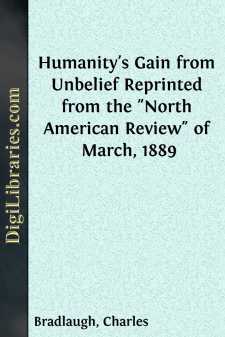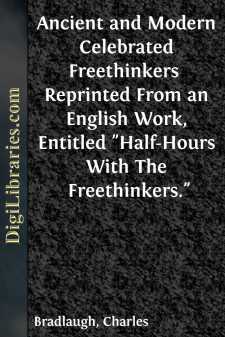Categories
- Antiques & Collectibles 13
- Architecture 36
- Art 48
- Bibles 22
- Biography & Autobiography 813
- Body, Mind & Spirit 142
- Business & Economics 28
- Children's Books 17
- Children's Fiction 14
- Computers 4
- Cooking 94
- Crafts & Hobbies 4
- Drama 346
- Education 46
- Family & Relationships 57
- Fiction 11829
- Games 19
- Gardening 17
- Health & Fitness 34
- History 1377
- House & Home 1
- Humor 147
- Juvenile Fiction 1873
- Juvenile Nonfiction 202
- Language Arts & Disciplines 88
- Law 16
- Literary Collections 686
- Literary Criticism 179
- Mathematics 13
- Medical 41
- Music 40
- Nature 179
- Non-Classifiable 1768
- Performing Arts 7
- Periodicals 1453
- Philosophy 64
- Photography 2
- Poetry 896
- Political Science 203
- Psychology 42
- Reference 154
- Religion 513
- Science 126
- Self-Help 84
- Social Science 81
- Sports & Recreation 34
- Study Aids 3
- Technology & Engineering 59
- Transportation 23
- Travel 463
- True Crime 29
Charles Bradlaugh
Charles Bradlaugh (1833–1891) was a British political activist, writer, and one of the leading figures of the secularist movement in the 19th century. He co-founded the National Secular Society in 1866 and campaigned for freedom of thought, atheism, and social reform. Bradlaugh authored works like "The Impeachment of the House of Brunswick" and "Humanity's Gain from Unbelief," promoting rationalism and challenging religious orthodoxy. Despite facing legal challenges for his atheism, he was elected as a Member of Parliament and fought for the right to affirm rather than swear religious oaths in office.
Author's Books:
Sort by:
HUMANITY'S GAIN FROM UNBELIEF. As an unbeliever, I ask leave to plead that humanity has been real gainer from scepticism, and that the gradual and growing rejection of Christianity—like the rejection of the faiths which preceded it—has in fact added, and will add, to man's happiness and well being. I maintain that in physics science is the outcome of scepticism, and that general progress...
more...
THOMAS HOBBES. This distinguished Freethinker was born on the 5th of April, 1588, at Malmesbury; hence his cognomen of "the philosopher of Malmesbury." In connection with his birth, we are told that his mother, being a loyal Protestant, was so terrified at the rumored approach of the Spanish Armada, that the birth of her son was hastened in consequence. The subsequent timidity of Hobbes is...
more...



